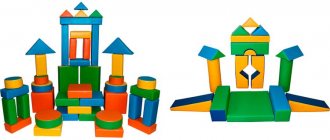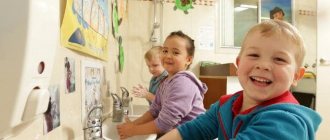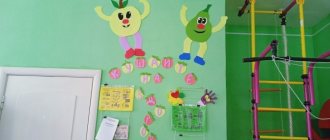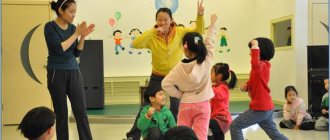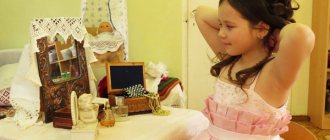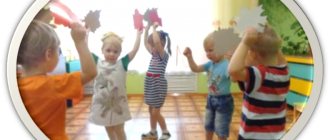Educational activities in special situations, taking into account the Federal State Educational Standard for Education
activities in restricted areas taking into account the Federal State Educational Standards for Educational Education
“Children are always willing to do something. This is very useful, and therefore not only should it not be interfered with, but measures must be taken to ensure that they always have something to do.”
Jan Komensky.
With the introduction of the Federal State Educational Standard for Education, the model for organizing the educational process has changed dramatically. The educational model has been replaced by a comprehensive thematic model through age-appropriate forms and types of children's activities. The solution of educational problems in this model occurs in the joint activity of children and adults and in the independent activity of children. This approach makes it possible to make the life of a child in kindergarten more interesting and interesting, and the educational process is more effective, since it brings the forms of learning closer to the child’s main activity – play.
Educational activities include direct educational activities, educational activities during restricted periods, and independent activities of children.
Solving educational problems within the framework of joint activities of an adult and children is carried out both in the form of direct educational activities and in the form of educational activities carried out during regime moments (solving educational problems is associated with the simultaneous performance of functions of supervising and caring for children - morning reception of children , walking, getting ready for bed, organizing meals, etc.).
Regular time is a certain time required to implement specific routine moments.
Educational activities in special moments in areas of child development (educational areas):
physical development
complexes of hardening procedures (health walks, washing hands with cool water before each meal, rinsing the mouth after meals, air baths, walking barefoot along ribbed paths after sleep)
morning exercises,
exercises and outdoor games in the afternoon;
social and communicative development
situational conversations during routine moments, emphasizing their benefits;
development of labor skills through assignments and assignments, duty, self-service skills;
assistance to adults;
developing safe behavior skills during security situations;
speech development
creation of a speech development environment;
free dialogues with children in games and observations;
situational conversations with children;
artistic and aesthetic development
the use of music in the daily life of children, in play, in leisure activities, on a walk, in visual arts, during morning exercises,
attracting children's attention to various sounds in the surrounding world, to the design of the room, the attractiveness of the equipment, the beauty and cleanliness of the surrounding rooms, objects, toys.
cognitive development
creation of a speech development environment, free dialogues with children in games, observations, situational conversations with children.
The educational process in a preschool institution should go on continuously, throughout the day, and not only during periods of direct educational activity. In all regime moments, we are obliged to create conditions for solving the problems of all educational areas. In educational activities, in special moments, I solve the problems of forming a common culture for children. This is daily work that is carried out throughout the entire time the children are in kindergarten.
When implementing routine moments, I try to take into account the individual characteristics of children.
This approach makes it possible to make the life of a child in kindergarten more meaningful and interesting, and the educational process more effective, since it brings the forms of learning closer to the leading activity - play.
Let's consider various options for modern forms of education, which are built on the basis of children's activities in special moments:
For every special moment I plan certain events.
Reception of children.
Individual conversations about the world around us: what the child saw on the way to kindergarten; natural, weather seasonal changes.
Conversations with all the children (“What did you do yesterday?”, “What would you like to do today?”).
Pronouncing nursery rhymes, exercises on onomatopoeia (“Who talks like that? A. Barto.”
Finger games for the development of fine motor skills (“Boat”, “A Raven is Sitting on an Oak Tree”, “This Finger is a Grandfather...” and others)
Board games (puzzles, inserts).
Didactic games on sensory.
During meals, I conduct situational conversations (about vitamins that are found in vegetables), about the rules of behavior at the table (“When I eat, I am deaf and dumb” and so on.
Preparing for a walk, walk.
During dressing, I use poems so that the children themselves take part in dressing (“Where is my finger?” N. Sakonskaya, “I myself” by S. Sef, “Our Masha is little..”). I draw the children’s attention to the child who is trying to put on something himself, and I praise them for their effort.
Satisfying the children’s need for physical activity, I plan outdoor games (“Bubble”, At the Bear in the Forest”, “Sparrows and the Car”, etc.) and individual work on the development of movements (balance, jumping, stepping over, throwing into the distance, at a target, etc. d).
In addition, daily observations of living or inanimate nature, transport, children and the work of adults. I definitely plan poems about what I observe.
In order for daytime sleep to be a complete rest, you need to create conditions for this before going to bed; we ventilate all rooms, create an influx of fresh air. While undressing and going to the toilet, we talk in a quiet, calm voice.
I chose to read daily in the afternoon. I read fairy tales, nursery rhymes, poems and short stories to children. I try not to turn readings into activities; I present the child with a choice - listen or do something else. But I try to make the reading process so exciting that the child becomes interested himself.
In addition to traditional forms of working with children, we will consider modern forms of working with children:
Children's experimentation as an active transformative activity of children, significantly changing the objects under study, allows children to successfully develop curiosity, activity, and the desire to independently find solutions to problems. Children are interested in different types of experiments. Experiments can be carried out at different regime moments: on a walk with sand, water, snow, etc., during the morning reception of children.
Dramatization games are play situations that encourage children to engage in positive forms of communication, develop feelings of empathy, responsiveness, and a desire to help. In their free activities, children use various types of theaters: puppet, tabletop, shadow. All this contributes to the development of coherent speech, the formation of communication skills in children (the ability to distribute roles, agree on the main role, take into account each other’s interests and desires).
We build the educational process in working with children using the principle of integration of educational areas. And here the fairy tale comes to our aid again. Through fairy tales, you can reinforce various mathematical concepts and introduce children to geometric shapes: we encrypt, model fairy tales, and hide heroes in figures. So, for example, in some fairy tales the mathematical principle lies on the surface - in the title: “The Three Bears”, “The Wolf and the Seven Little Goats”.
Surprise moments.
The content of this type of activity includes information acquired by children in the process of educational work and updated by the introduction of unexpected conditions, unusual aids and methods of organization. For example, the cat Leopold comes to breakfast, he tells me how delicious the milk porridge is today, offers to try it, the children eat it with pleasure.
Problematic situations in restricted situations help to solve many problems: developing hygiene skills, nurturing a culture of behavior, instilling rules of etiquette, etc., as well as involving children in the game and inducing them to think differently in order to find ways to solve this or that problem themselves.
Thus, educational activities during restricted periods should not be considered as an addition to the main educational activities. On the contrary, in the new regulatory documents the emphasis is shifted from the main educational activity to educational activity during special regime moments.
And I would like to end my speech with the words of educator John Dewey: “We are depriving children of a future if we continue to teach today as we taught it yesterday.”
Get text
Why does a child need a regime?
A child's daily routine is often based on their diet. Children get used to the fact that in the morning they get up, wash, have breakfast, study or walk, then have lunch, rest, and so on until bedtime. If this separation does not exist, then problems with food begin, because the child can snack on yogurt, a bun, or fruit at any time. As a result, he does not feel the hunger that is necessary for a full meal.
It is interesting that often in a family where dietary routines are not followed, parents do not worry about maintaining the daily routine in general. This leads to the fact that the time of waking up and falling asleep is always different, daytime sleep is an inconsistent phenomenon.
It has been proven that children are conservatives. They feel much calmer when they know what awaits them next, and react sharply to changes in planned actions.
The behavior of children who do not have a daily routine is characterized by frequent emotional outbursts in the form of hysterics for any reason; their level of aggressiveness and conflict may increase. It's difficult to get babies to sleep at night. If he wakes up late, he therefore does not rest during the day. The nervous system is overloaded, making it difficult for the child to readjust and sleep peacefully.
To prevent this from happening, it is better to stick to a certain schedule, even if not very strict.
Summarizing
Analyzing the regime moments in kindergarten, you can notice that some points remain unchanged for all age groups. These include:
- Morning reception of children.
- Eating.
- Developmental activities.
- Game activity.
- Walk.
However, preschool leaders try to develop a daily routine in such a way as to take into account the age characteristics of children in each group.
Preparing for quiet time and getting up
Lunch is about the same as breakfast. Here, too, duty officers are appointed and given feasible tasks.
Regular moments are also observed after meals, when preparation for bed begins. To do this, the teacher must strictly monitor discipline in the group so that the children do not play out and make noise, creating a mood for relaxation. The environment should be calm so that the guys can relax.
In the process of preparing for bed, the teacher is faced with the task of continuing to instill in children a caring attitude towards things and encouraging positive emotions regarding daytime rest.
During the rise, children should not be distracted by extraneous things, but immediately get dressed and then wait for the others. At this time, you can offer your child a quiet game, for example, putting together a simple puzzle.
Developmental activities for children
Regular moments in the garden necessarily include developmental classes in mathematics, speech development, drawing, modeling, physical education, music, consolidation of everyday skills, and others.
Most often, classes last no more than half an hour, because children at that age are not yet able to maintain attention for a long time, which is why they need a constant change of activity.
Naturally, the duration of classes in the nursery group differs from that in the preparatory group.
Another weighty argument in favor of the regime
Sometimes parents are satisfied with such a life when the child is free to make his own decisions. However, problems begin when it comes time to go to preschool. Regular moments in kindergarten are strictly observed, and it will be very difficult for a child to adapt if he is not used to them.
Therefore, parents are strongly advised to familiarize themselves with the daily routine at the preschool educational institution and organize their day in advance as close as possible to the kindergarten schedule. This will make the child’s life easier while getting used to new conditions.
